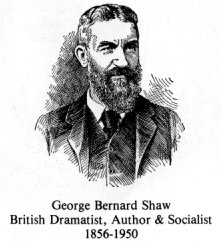G.B. Shaw: Music Critic
Today, I'm uncomfortable with a form of greatness. The University of Houston's College of Engineering presents this series about the machines that make our civilization run, and the people whose ingenuity created them.
 I've just read a book of George Bernard Shaw's old music reviews. They are a trouble to my mind. But first, you may ask: "What was Shaw doing as a music critic?"
I've just read a book of George Bernard Shaw's old music reviews. They are a trouble to my mind. But first, you may ask: "What was Shaw doing as a music critic?"
Shaw's mother was deeply involved with music. The whole musical scene of Dublin, Ireland, swirled about his ears when he was a boy in the 1860s. He never formally studied music. But then, he never studied play-writing, either. He may have been as fine a music critic as he was a playwright.
Shaw's reviews show the same dazzling inventive mind that his plays do. They both bear the same harsh witness to human folly. For example, after a two-page assault on Hubert Parry's now-forgotten oratorio Job, he concludes:
I have no wish to linger over this barbarous task. ... But [Parry] might have let Job alone, and let me alone; for patient as we both are, there are limits to human endurance. I hope he will burn the score.
Shaw has no use whatsoever for Rossini. He cries,
... enough of Rossini ... I cannot say "Rest his soul," for he had none; but I may at least be allowed the fervent aspiration that we may never look upon his kind again.
That's pure personal prejudice -- a quality Shaw gleefully embraces. Objectivity has no place in art criticism, he insists. Art doesn't exist in an objective world. "It is," he says, "the capacity for making good or bad art a personal matter that makes a man a critic."
And here my discomfort rises. For Shaw, like the best critics today, sees himself as a refining fire, purifying art. He denies that he or any critic holds the power to make or break artists. Bad artists sink on their own demerit, unless there are enough Philistines around to buoy them up.
So Shaw slashes his way through the music of the 1890s. The new opera Cavaleria Rusticana is a pretty collection of tricks that will not last. Cavaleria did survive Shaw, but I'm not sure why it did. He's right on target when he dooms Sir Arthur Sullivan's only grand opera, Ivanhoe. It is, he sneers, "smooth, orderly, and within the bounds of good breeding."
Shaw the critic appeals to the child in me -- the child who loves to smash and break. One side of me says that we need, constantly, to winnow the chaff from art -- and from technology as well.
I'm in somewhat the same business, but it frightens me. It can corrode my soul to sit in judgment on people who can do things I cannot do. Fine art and fine technology must be put to the test. But people who get too much pleasure from those dissections frighten me. They do frighten me.
I'm John Lienhard, at the University of Houston, where we're interested in the way inventive minds work.
(Theme music)
Shaw, G.B., Shaw in Music. (Eric Bentley, ed.), New York: Doubleday Anchor, 1955.
As a matter of interest, Shaw wrote under the pseudonym Corno di Bassetto. That's the Italian for basset horn. Shaw tells us that the basset horn in a "wretched instrument," which would have long since been snuffed out had Mozart not used it in his Requiem. "Its peculiar watery melancholy ... is just the thing for a funeral," he says. "The devil himself could not make a basset horn sparkle."